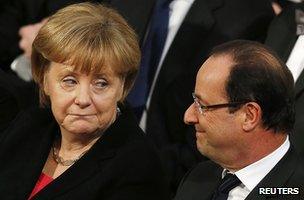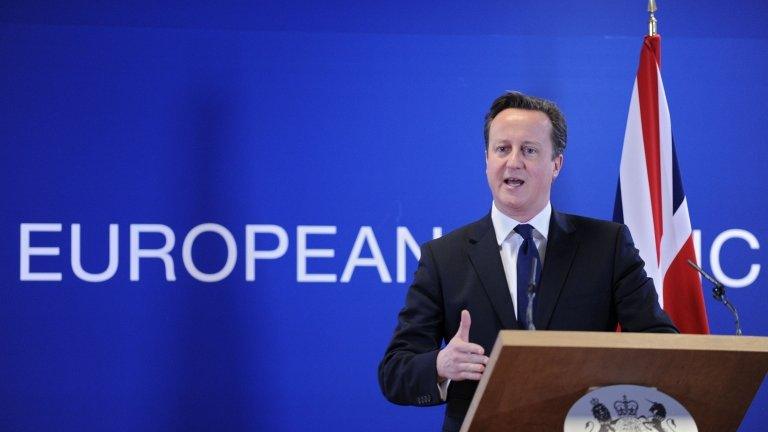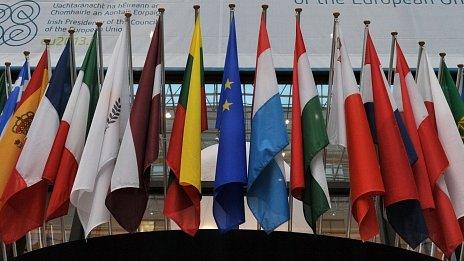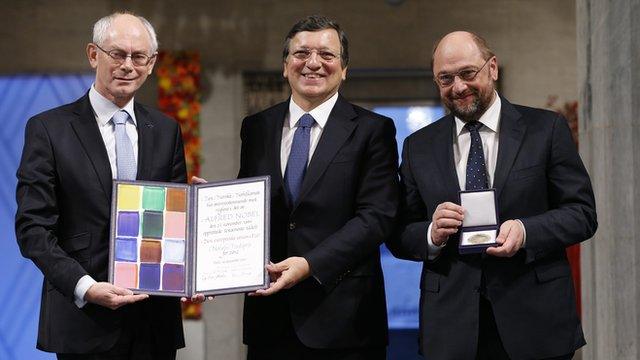Europe: A week of speeches and symbolism
- Published
- comments

France and Germany displayed unity at the EU's Nobel Peace Prize ceremony in December
In Britain it may be the week of David Cameron's much-awaited speech, but in the rest of Europe it is the week that celebrates 50 years of Franco-German friendship.
On 22 January 1963 General de Gaulle of France and Germany's Konrad Adenauer signed the Elysee Treaty, external in Paris. On Tuesday the friendship between the two countries will be lavishly celebrated in Berlin.
The foundation stone of the European project has been Franco-German co-operation.
Gen de Gaulle described Europe as "a coach and horses, with Germany the horse and France the coachman".
Despite ups and downs in the relationship, Germany and France have been the designers and shapers of the EU that the British are now agonising over.
There will be a stark contrast this week. David Cameron will warn that, without changes, "the danger is that Europe will fail and the British people will drift towards the exit". Chancellor Merkel and President Hollande will speak confidently about not only the Franco-German relationship but the future of Europe.
In Berlin the French flag will fly beside that of Germany. There will be a joint cabinet meeting, a dinner and a concert. More than 500 French MPs will travel to the German capital for a joint session with the Bundestag. It will be a festival of friendship.
The relationship on many levels is remarkably deep. There have been eight million student exchanges between the two countries. More than 2,000 French and German towns have a partnership. The political links are equally strong, but at times tempestuous.
There have been moving history moments, like in 1984, when Francois Mitterrand and Helmut Kohl held hands at a World War I cemetery in Verdun. There have been difficult times. President Chirac and Chancellor Schroeder detested each other before learning to work together. President Sarkozy and Chancellor Merkel, despite many arguments, became allies and friends during the fight to save the euro.
Different visions
This week's celebrations cannot disguise that the current relationship is strained. On President Hollande's side there is still bitterness that Chancellor Merkel backed Mr Sarkozy so openly during the French election. Mr Hollande believes that the Germans are wrong to place such emphasis on austerity and cutting deficits. He has challenged German power by insisting "it is not for Germany to decide for the rest of Europe".
Mr Hollande has, on occasions, sided with the Italians and Spanish against the Germans. He has suggested that Mrs Merkel's actions in Europe are being driven by the German elections in September.
The core of the problem is that the two countries are no longer equals. Economic success has made Germany Europe's indispensable power . A recent poll suggests far more Germans view the relationship as equal than the French, who have become the junior partners.
President Sarkozy told the French they needed to become more like the Germans - but that did not go down well with voters. One-third of the French, in a recent poll, harbour envy or mistrust towards Germany.
The Germans openly worry about France. One of its papers ran the headline "France, the new Greece?" Berlin believes that Mr Hollande has wasted his first months in office. The Germans note a decline in French competitiveness. They point out that Spain, Italy and Greece are doing more to reform their economies than France.
Out of sync?
The former French President Valery Giscard d'Estaing said Europe "cannot move ahead without the Franco-German engine". Ulrike Guerot, from the European Council on Foreign Relations think tank, says "France must regain its stability in order to find a balance with Germany for the good of Europe".
So the UK is calling for Europe to change at a moment of uncertainty in the Franco-German relationship.
Both countries want Britain in the EU as a counterbalance to the other. The Germans see the British as an ally over free trade and open markets ; the French are less willing than the Germans to hand over sovereignty to Brussels. What neither country will tolerate is Britain disrupting or in some way paralysing the project.
For all the current strains it is France and Germany who will continue to shape the future of the EU - with or without the UK.
So this week it is worth listening not just to David Cameron's speech but also to the words coming from Berlin.
- Published23 January 2013

- Published20 January 2013

- Published10 December 2012

- Published24 September 2015